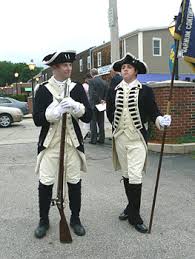|
Gamer Forge Listener Email: Name Calvin Garcia Comment In the D&D group I play with one of the players insists that when you reach a new level you have to zero your experience. However when I checked the PHB1 there is no reference to this. PHB1 uses the term Total Experience when talking about leveling up. Which is correct? Gamer Forge Response: Say, whaaaat? DCR says: No. no, & no. Your friend is either severely misinformed, or feeding you a line. Experience points (XP), is a progressive jackpot. It would take forever to gain levels if your XP total reset each time you "ding". Hence the term, "grinding". Gamer Forge Listener Email:
Name Steven Cowan Comment When in Ravenloft, would the town in question know that the Dark Lord is indeed, say, a vampire? That he or she would be the real ruler of that Domain? For example: Barovia. Strahd has been there for a long, long, very long time. How do the villagers see him? Simply an undying ruler (if a ruler at all)? For what he is, a powerful vampire? The real ruler of Barovia? His castle… simply a haunted castle that's been there since the beginning of Barovia? Or that the Castle Ravenloft is the home of the Vampire Dark Lord? I guess it could vary from DM to DM, but I have always wondered how would you explain it. Are the people in each domain in denial, would they know by now, etc.? Gamer Forge Response: We have no witty segue into this one. DCR says: 1. What's the alternative? Maybe the citizens put up with a vampire lord because the surrounding area is at least ten times worse than in the domain of the castle. You head into the surrounding countryside and you are threatened with death all day, every day. While the land around the castle is, at the very least, protected. Thus, the villagers put up with the occasional abduction/sacrifice. 2. Again, the alternative: maybe the villagers are totally okay with their undead ruler. Maybe the town sees the need to give up one of the town's virgins to ensure the safety of the rest of the population. Who knows? Maybe the vampire offers excellent health insurance and a 401k. So where does this leave the heroes? This idea might be best left for when you're ready to throw a curve ball at your players. 3. The easiest thing to take into account would be time frame. What point on the timeline will your heroes be making their appearance. If they are early in the canon, then maybe the villagers don't know for sure what rules Castle Ravenloft. Later on, you can easily justify the townsfolk knowing more about what goes on up there. Your heroes might not be the first heroes to show up... Gamer Forge Listener Email: Name School Teacher [email protected] Comment Dear Dungeon Crawlers Radio, I work with students that have a lot of difficulty performing roles that benefit the group as a whole. Their mentality is that they all want to be the winner or at least play the most important part, and so they struggle with the fact that everyone is important and plays a role in success for the group. I am asking here because my knowledge of any kind of RPG where roles are assigned and must be performed is extremely limited. Any help would be greatly appreciated. I have 10 year-olds, usually 8-10 of them. Fantasy is fine, but probably need to stay away from demons and black magic. My initial thought that started this was an economy type rpg. What I'm really looking for is a game where the students are required to perform a role that differs from everyone else's, and if they don't perform it well (as in trying to do someone elses "job") they fail as a group. Thank you, Gamer Forge Response: Hmmmmm....DCR says: 1. Try splitting the class into groups of no more than four, then give each group a choice of character to which the group decides actions. Then, the whole class becomes a controlling interest in the party, and every important decision is made by the class and success/failure rests on the students. Pre-generated characters will most likely serve you best, but at least consider letting the groups generate a character. That way they make more decisions regarding the outcome. No, seriously. Use the link above. It's free and saves you a bunch of time. 2. This isn't tee-ball! If you enter with the mentality that failure cannot happen, for whatever reason, then you are depriving your student of the most important life lessons. Namely, coping with failure. Ideally, the students will succeed and the adventure continues. We say, make a big deal about the big decisions, and if the "character" doesn't quite succeed, make it light hearted, move on quickly, and bring the focus back to the story, not on the failure. Trust us, the students will feel it, and internalize those feelings. But they must learn to cope with the failure, not just success. 3. Don't get too mundane. Its a good opportunity to incorporate lessons on economy and the barter system. Just remember not to let mundane events become the focal point of the game. *Bonus XP: If you need a more educational reference about antagonists and how they rule, remember that during the American Revolution (you know, the one that made the United States of America), good people still supported England, even though they colonists hated being taxed like they were. Not necessarily out of loyalty, but because England was still trying to take care of it's colonies. Sure, it wasn't exactly a bang-up job, but what do you expect from an Empire that was growing too large to manage.
0 Comments
 Terror in it's purest form. Gamer Forge Listener Email: Name Richard Jacobs Comment I'm interested in when this constraint from vampire lore was first integrated into Dungeons and Dragons mechanics: has it been there since the first D&D vampire? Vampires are... unable to cross running water, although they can be carried over it while resting in their coffins or aboard a ship. The garlic legends I'm passingly familiar with, mirrors, crucifixes and inability to enter uninvited also. When was the first D&D vampire unable to cross running water? Is there some sort of explanation in any game-related material apart from "that's the way it is?" This came up during a pre-made adventure. In this game a vampire was entombed in an underground complex. After failing to defeat the vampire in his own tomb (I know, my characters rocked) his next move as per the module was escape out the front. Unfortunately for the author they constructed the adventure so that we had to cross a stream before we even entered the complex. In the eyes of a 3.5 (possibly earlier?) vampire this means nigh-certain containment. My characters destroyed his coffin and steal his grave dirt (leading to abuse of the phrase "I've got a jar of dirt") and the DM had him dominate people across the stream to dig him out from above the cavern, effectively sidestepping that quirky rule. After a few months, though, I haven't been able to puzzle out why that weakness even exists. Is there any official discussion of the implications of vampire weaknesses in D&D and how to work with them? Gamer Forge Response: Because Role-Playing Game, that's why. DCR says: 1. Since always. Vampires were included in the original box set in 1974. The commonly held stories were used as part of the D&D mythos from the start. It's about commonality. The term "vampire" is so ubiquitous with our culture, the image so ingrained in the collective education of the last century, that "vampire" has a history book all it's own. If D&D were to suddenly change the definition for their game, nobody would want to play it. Part of the allure of fighting Dracula is the feeling of heroism that comes from defeating Dracula. If Dracula were to suddenly resemble Chewbacca, then the prospect of defeating him isn't cool anymore. 2. You have to quantify the challenge to put it in context with a game. Defeating or otherwise successfully navigating a vampire must be worth something, or worst case scenario, failing to defeat the challenge must be worth something as well. 3. The idea of vampires having limits isn't something invented for the game. The reason a vampire has weaknesses is so we can contain it within our own imaginations. If we envision an embodiment of pure evil and temptation and it has no weakness, it crosses the boundaries into a psychosis. It becomes something that in our own minds can't be stopped. We become terrified of our own idea. Not cool.  Forsooth! I have come in the name of Pelor to smite evil! Gamer Forge Listener Email: Name Stanley Finnley Comment In just about every edition of D&D (save for 4e), Paladins are required to be Lawful Good. If they stray from that, they are completely stripped of their powers. This means that evil deities can't grant powers to paladins or if they do, they go into a new class (e.g. Anti-Paladin). My question is: why? Why was it designed that paladins have to have such a strict alignment? It seems to me that it unnecessarily pigeonholes the character types and doesn't make sense in D&D world. After all, couldn't evil deities have holy warriors? I also don't understand the mechanical decision about why was it designed that an evil Paladin has to be a different class. Wouldn't this create a problem if you wanted to redeem an evil Paladin into a good one? This never really made sense to me until 4e where they just dropped the Lawful Good restriction entirely and let you have a Paladin of Vecna (or have that Paladin of Vecna become a redeemed Paladin of Pelor without having to switch classes). Gamer Forge Response: Another Paladin question!?!?!?! Are you guys trying to stump us with this subject, or is it legit confusing? DCR mercifully says: 1. The alignment isn't strict. The tenants of the deity are. "Lawful" can (and does) indicate adherence to a code. "Good" indicates that the code is good in nature. This also should not have a bearing on the personality of the Paladin in question. Put the two together, and you shouldn't get "lawful stick-up-the-butt". 2. The Paladin becomes an "Anti-Paladin" or "Blackguard" prestige class if and when they deviate from the deity's tenants or in some way lose favor with their deity. Remember, a "paladin" is an exemplar of the deity's aspects or "domains". Part of the code of conduct should include advancement and perfection of those aspects. Similar to the aspects of a "monk". 3. But in 4th edition D&D, the "Blackguard" becomes a character class from 1st level. The "good" thing isn't really a factor. You can find it in Heroes of Shadow supplement book. In all honesty, it's not very good. Seriously, it's soooo not worth it. Gamer Forge listener Email:
Name Mystery Man Comment Can a sleeping character hide at all? If they do so, do they roll Hide when they go to sleep (for hiding their sleeping spot, etc.), or do they make an opposed roll every time someone attempts to spot them? Gamer Forge Response: When trying to grab a few extra winks, DCR says: 1. Finally, an easy one. You can attempt to hide yourself before you go to sleep. That's called camouflage. But you can't do it while you're sleeping, as it is something that you must concentrate on. Bonus XP: The Paladin and Monk have a good deal in common. Indeed, the two could learn more than one thing from each other. The Monk follows an ideal along the lines of "pursue to perfection", hence the physical training regimen. Also, think of concepts like "mind over matter" and apply them to the Paladin. While you're at it, why not create your next character as a Monk, but call yourself a Paladin. Now you can see the similarities, we hope. Also, take a trip back in time by watching Enter the Dragon with Bruce Lee. A good guy following a code of honor while fulfilling the tenants of his order and questing? Yep. That's a paladin, all right! |
The GamerForge is DungeonCrawlersRadio’s most favoritist segment of the entire show. Have you ever had a boggling rules question that no one in the group can figure out? Write in to us and we’ll help try to solve it! Are you a Game/Dungeon Master who needs help squashing animosity at the table or dissension in the ranks? Perhaps we can help!
If you are in need of help, encouragement, or an uber devious way to get a TPK, we are here to help. No matter your needs, we’ll help you get more from your gaming! The Gamer ForgeWhere Players & Game Masters can come for valuable information to level up your game! Archives
August 2013
Categories
All
|


 RSS Feed
RSS Feed








